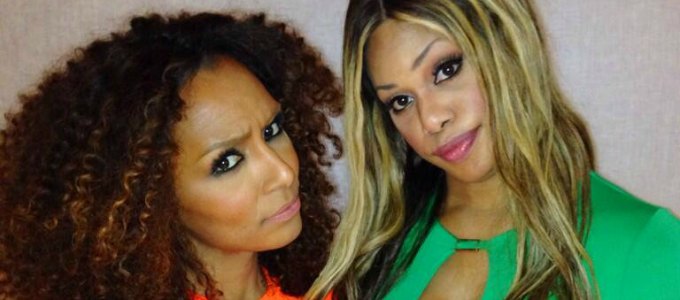LGBT activists Janet Mock and Laverne Cox both wrote essays supporting Caitlyn Jenner but also acknowledge how racial and economic divides affect the transgender community. (Photo by Janet Mock, Credit: Twitter)
I’m thrilled for Caitlyn Jenner. I can’t imagine what it must have been like for her to deny who she was her whole life. I have to give her props for accomplishing so much despite what must have been a big hole in the soul based on what I’ve read and heard her say on TV.
At times, I imagine it must have been horrid to walk around hiding from everyone, feeling so isolated, so trapped behind a mask, I suppose you might say. A mask that enabled her to look out, but no one else to look in.
She’s going to do a lot to bring awareness and hopefully acceptance to transgender people and the struggles that they, and many of us, go through trying to be our authentic selves. But I saw something on Instagram that made think about the disparity between black and white, rich and poor, known and unknown as it pertains to personal freedom of identity.
The post showed Michael Jackson in two pictures, one pre-skin bleaching and nose job, the other afterward, complete with straight hair. And those two photos were on top of one of Bruce Jenner next to one of Caitlyn. The caption read: “Insulted and judged him for this…but praise and call him brave for this?”
Of course, Michael Jackson and Jenner are two completely different people. Superficially, the only thing they have in common is both are household names. But it made me think about the different experiences black or poor transgender people would have compared with their white counterparts — the differences in experiences between minorities and non-minorities, period.
There is a difference — a big one. The backlash and negativity for a black body is usually far greater than for a white one given the same extenuating circumstances; research supports that. Consider the harsher jail sentencing for black offenders vs. white offenders for the same crimes, for instance.
Black, transgender actress Laverne Cox, who appears on the popular show “Orange Is New Black,” was on the cover of Time in May 2014 as part of their piece titled “The Transgender Tipping Point." She issued her own response in support of Jenner but hinted that their experiences, while largely positive, do not reflect the reality of most transgender people.
Celebrities, of course, seem to get special treatment regardless of race. But I can’t help but think the reception for a nonwhite, noncelebrity coming out as Jenner did would have been far different. From what I’ve seen, support for her has been overwhelmingly positive. I haven’t scoured all media outlets or done a count of goods vs. bads — one ridiculous and easily ignored petition to revoke Jenner’s Olympic medals stood out because of its sheer stupidity — but would the level of support have been the same if she was black, or if she was poor?
As we applaud Jenner, and discuss the myriad implications of her brave and very public revelation, it’s something to consider.
Model Janet Mock discussed the impact that glamour and privilege had on Jenner's big reveal far more eloquently than I. More important, she reminds us that Jenner herself made a point of acknowledging that her actions follow those of courageous black women who took the plunge first amid much danger and violence, and helped pave the way.
For good or ill, things are changing. I just learned that tonight, ABC Family is debuting a docuseries on another white family whose father is making a gender transition. It’s called “Becoming Us." Ryan Seacrest, who is also responsible for “Keeping Up With the Kardashians,” is producing.
Women like Mock, Cox and Jenner are making waves, using their personal struggles and triumphs to open doors that were firmly closed, even locked. But let's not forget that the doors they've opened don't open as wide or as welcoming for everyone.















